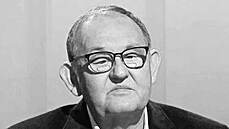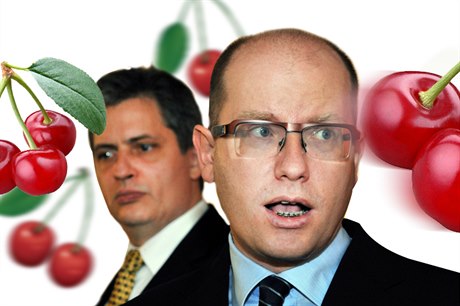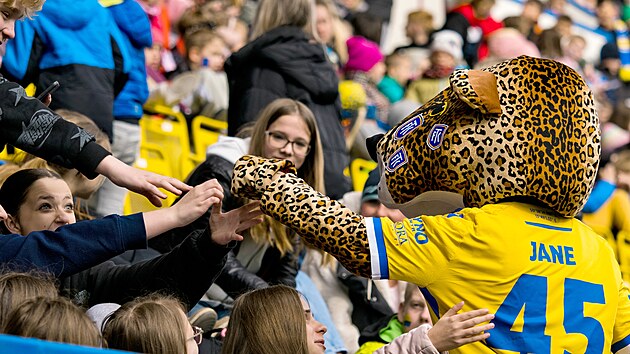If Senator Jaromír Štětina (elected for the Green Party and now a representative of TOP 09 and the mayors union, STAN) continues in his heuristic activities, on February 24 he will have noticed Marta Semelová’s statement at the grave of Klement Gottwald.
Semelová, the chairwoman of the Prague communists and a Communist Party (KSČM) deputy in the lower house is a history teacher in civilian life, known for her devotion to the ideas promoted between 1929 and 1953 by the general secretary and later chairman of the Communist Party and mastermind of the communist putsch, i.e. “the victory of working people over reaction” in February 1948.
However, if on the occasion of the 64th anniversary of the February putsch in Czechoslovakia she declares that “the [post-February] regime was not criminal: the criminal state came into being only after 1989,” she will make many people feel nauseous.
Over the past few years, Štětina and his colleagues have gathered several hundred testimonies regarding the nature of the Communist Party in the hope of adding fuel to the attempt to have its activities banned by law. Though Štětina has not even promoted his ideas in the Senate, the center-right government led by PM Petr Nečas (Civic Democrats, ODS) has been inspired by his initiative and last summer instructed the Czech ministries of the interior and justice to draw up a proposal for a suspension of the activities of the Communist Party.
The example of the Workers’ Party
Only the government is authorized to submit such a proposal. The Supreme Administrative Court will decide on it. A pioneering attempt of this type was made by the then Interior Ministry Ivan Langer (ODS) to wipe from existence the extremist and pro-fascist Workers Party (DS) by means of the Court. However, he was unsuccessful because judges discovered weaknesses in the government proposal and rejected it.
In its ruling the court also defined the barrier which, if crossed by a political party or movement, would see such a party or movement suspended by law or a ban placed on its activities. So the government fine-tuned Langer’s proposal and this time was successful before the Court. However, it should be noted that in the intervening period the leadership of the DS and its most active members simply joined the newly created Workers Party of Social Justice (DSSS).
The Communist Party would undoubtedly do something similar were it to be disbanded by the courts. The Interior Ministry is responsible for preventatively verifying the activities of the civic associations with which the KSČM collaborates, and members of the party could, for instance, seek refuge under their wings. Given that party members’ average age is over 70, it would be unrealistic for party members to seek temporary accommodation in the Union of Young Communists of Czechoslovakia or the Communist Youth Union, though the Club of the Czech Borderland would be a more promising destination. Both “youth” organizations especially hold extremist opinions and, unlike the more cautious KSČM, advocate revolutionary forms of struggle against capitalism.
The party is not extremist
In order that the government does not make a fool of itself and see its proposal for the suspension of the KSČM’s activities go the same way as that relating to the Workers Party, the Interior Ministry has had four specialist analyses conducted: by the lawyer Pavel Uhl, the experts in extremism Michal Mazel and Miroslav Mareš, and an expert in crime investigation, Ivo Svoboda. A summary of their findings comes to 17 pages of detailed argument; the conclusion is that right now the ministry does not have sufficient grounds to draft a proposal for the suspension of the KSČM’s activities and justify to the government its submission to the Supreme Administrative Court. Former KSČM chairman Miroslav Grebeníček recently let slip that the Communist Party is being ‘monitored and bugged’
The document also states that the Security Information Service (BIS) was also contacted, but did not apparently provide the ministry any information regarding the activities of the Communist Party. How can this be? Former KSČM chairman Miroslav Grebeníček recently let slip that the Communist Party is being “monitored and bugged.” In other words, even if the BIS had any information on the party, it would not officially confirm this.
The experts warn that neither the BIS nor any other state authority has defined the Communist Party as an extremist organization in publicly accessible documents since 1989. Just to remind ourselves: the fact that the KSČM is dubbed an extremist organization by the rightwing press and certain politicians is insignificant from a legal point of view, being simply the expression of a personal opinion. But let’s continue: the party, state the experts, does not call for or organize violence, does not create paramilitary units (like the People’s Militia used to), does not mount terrorist or other violent attacks, and does not advocate the seizure of the functions of state authorities (á la Bolshevik “All Power to the Soviets!”).
Cautious communists
As opposed to the Workers’ Party, KSČM members have never been sentenced or fined in connection with their political activities. On the contrary, the party is extremely cautious and does everything to ensure that it does not come into conflict with the law. Its rules, regulations, manifesto and other documents are carefully scrutinized and tweaked by the lawyers that the party has in plentiful supply. However, the KSČM’s documents are lifeless, vague, general and — to put it bluntly — opportunistic. The influence of the lawyers comes across clearly.
And what about MP Semelová and other similar elements in the Communist Party? This is above all “retro” for the older “comrades,” who make up the vast majority of the party’s membership base. And what about the communist symbols? These don’t matter? A red star and the hammer and sickle! According to experts from the ministry, firstly in the Czech Republic there is no list of banned symbols, use of which would be automatically criminal, and secondly the red star and the hammer and sickle do not belong exclusively to the communists (in the way the swastika belongs to Nazism).
And if it is true — and the experts should know it — that according to the European Court of Human Rights the red star symbolizes the five fingers of the worker on all five continents, then as far as the symbols they use are concerned, the Czech communists are scot free. It doesn’t even make sense to pressure the KSČM to change its name. (Although another EU court has banned registering the symbol as a trade mark.) Why? Well, say the experts, the meaning of a party’s name is a strictly symbolic matter. It might outrage some members of the public, but this is without significance in law.
Part of a democratic system
All in all, right now the government has more urgent issues to deal with; even more so if the is an economic downturn with attendant social upheaval. Persuading Interior Minister Jan Kubice (nonaffiliated) to get hold of other experts and provide them with the materials with which it will be possible to appeal to the Supreme Administrative Court without the risk of ignominy is hardly a priority. And this means the Communist Party can continue to pursue its activities as a regular part of a democratic political system.
Even though the KSČM has not yet come to terms with its past and we can only guess at its real plans and objectives, the question arises whether in time we will be obliged to deal with it as with any other democratic party. For not only have repeated attempts at isolating it failed, but 22 years after the fall of communism the Communist Party is the only mass political party in the Czech Parliament.
True, the number of its members has shrunk by approximately a quarter (today the party has fewer than 60,000 members). According to a survey by the Public Opinion Research Center (CVVM), the KSČM voter base is aging fast. If the tempo continues, it will take another two, three or even more four-year periods of office before the process of natural wastage of the membership base and voters culminates in the Communist Party disappearing from the Chamber of Deputies (lower house of Parliament).
Will the Bohumín resolution pass away?
By the way, according to an “analysis” conducted a few years ago by a certain large newspaper, the Communist Party should lose its representation in Parliament as early as 2013 or 2014. In reality, at present the party has 26 MPs and a recent survey of voter preferences by the CVVM indicates that were elections to be held to the Chamber of Deputies, the KSČM would acquire 15.5 percent of votes, putting it third behind the main opposition center-left Social Democrats (ČSSD) and the center-right Civic Democrats (ODS).
However, if the only other party to make Parliament were to be TOP 09 — i.e. there would be only four political parties, and the ČSSD won the election, which is a real possibility after the “reform gift” of Nečas’ government — the Social Democrats would not get along without the KSČM if they wanted to promote a leftwing platform.
In such a situation representatives of the Social Democrats concede the possibility of forming a minority government with the silent support of the communists. However, what if the KSČM simply rejected such a hidden share in power and Lidový dům (the ČSSD headquarters) didn’t want to end up in opposition after a “flawed victory,” as happened in the 2010 election? Wouldn’t they have to offer the communists a joint governing coalition?
Up until now this has been a taboo subject for the Social Democrats, and their representatives have strongly rejected any idea of an open coalition with the KSČM. However, experience of the cooperation of both parties in several regional authorities, if it won them brownie points in this year’s autumn regional elections, could see the current taboo being forgotten, and the 18-year old Bohumín resolution, which forbids the Social Democrats from cooperating with the communists on the highest level, might be allowed to lapse at the next party conference of the Social Democrats in spring 2013.
Restriction of influence
Either way, the wishes of Senator Jiří Dienstbier Jr., a ČSSD vice chairman, would not be fulfilled by the next elections. In late February, he declared in the daily Hospodářské noviny that it would be better if an independent court and not politicians judged whether the communists were operating within a democratic framework or not.
“If one party operating outside the system holds up to 20 percent of seats in the Chamber of Deputies, this is a big problem of our political system. If you form a majority from 80 and not 100 percent, you have to reach completely different types of compromise than in the case of a fully legitimate political spectrum. And certain anomalies of the past, for instance the opposition agreement [between ČSSD and ODS from 1998–2002], were a consequence of this situation,” Dienstbier said. Including the KSČM in government would mean giving it a share of responsibility for the country’s situation and so undermine the rebellious rhetoric by which it appeals to some malcontents.
Let’s conduct a little thought experiment. If an independent court decided that the KSČM was not operating within a democratic framework and suspended its activities or even disbanded it, the ČSSD would lose its competition on the left and the currently more moderate supporters of the Communist Party would vote for the Social Democrats in significant numbers. And on the other hand, if an independent court found the KSČM to be a democratic party, the more radical wing of the ČSSD might pluck up the courage to offer the hand of friendship to the communists.
Just in passing, in a laboratory this would be worth a go! True, in a post-communist country like the Czech Republic it would be somewhat risky. However, including the Communist Party in government would mean giving it a share of responsibility for the situation in the country and would undermine the rebellious rhetoric by which it appeals to a certain type of malcontent. In France and Italy there was a time when they accepted local communists into government (and consequently lost a significant number of voters and therefore some influence).
Courage is lacking
However, neither ČSSD chairman Bohuslav Sobotka nor Dienstbier are like the former French President François Mitterrand and are unlikely to have the courage to make a similar attempt. They are capable only of calling for a vote of no confidence in the government, even though it has no chance of success, since Public Affairs (VV) will be loyal to the coalition. VV knows that a premature election could well mean political death for them. For this reason they won’t be inclined to lend a helping hand to the social democrats and communists. This would arouse interest and draw the public’s attention to the social democrats.
The dispute over competence with President Václav Klaus before the Constitutional Court, if provoked by a ČSSD-controlled Senate, is a serious, not to say fundamental theme. But it is a theme above all for “connoisseurs” who enjoy immersing themselves in the Constitution. However, in the Czech cauldron there are too few of these for the Social Democrats to win the elections.





